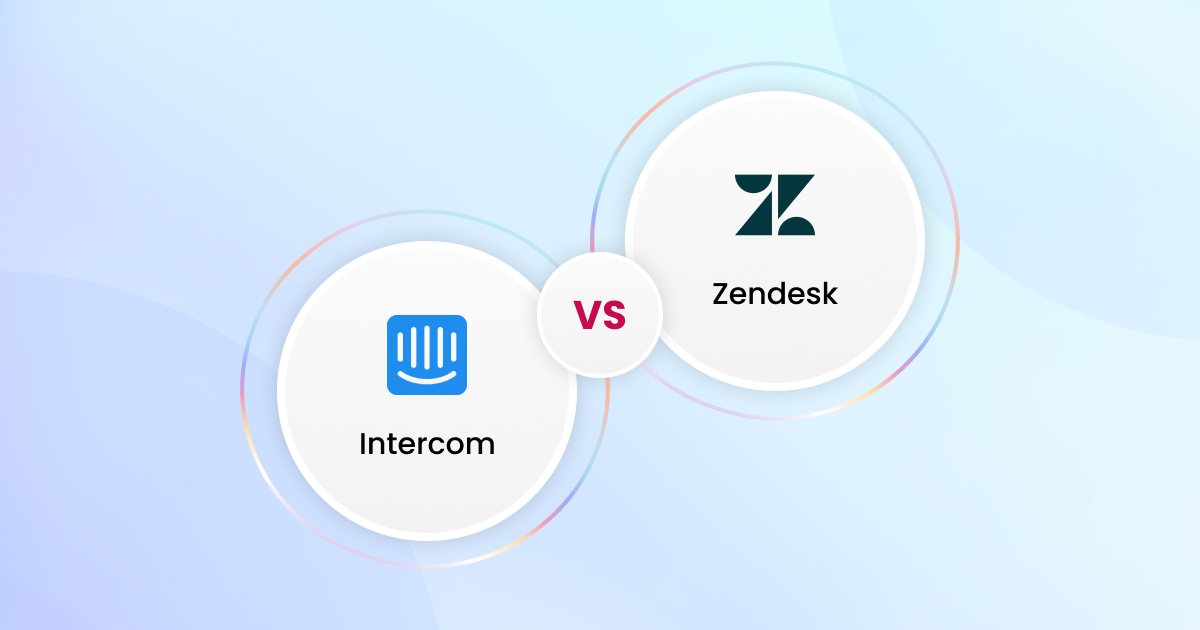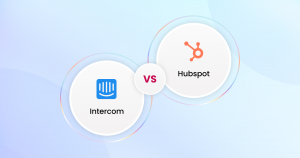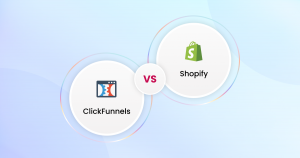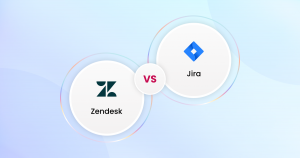When comparing Intercom vs Zendesk, focus on your specific needs and contract terms.
Zendesk offers a robust ticketing system and transparent pricing, ensuring a reliable ROI without hidden fees, unlike Intercom. While Intercom excels in real-time engagement, Zendesk’s extensive support features often lead to greater efficiency.
Choose a platform that fits your budget and enhances customer experience. Explore the strengths of each to make the best decision for your business.
Both platforms offer key features of help desk software that can improve your customer interactions.
Let’s investigate why this comparison matters and how it can raise your customer interactions.
Overview of Zendesk and Intercom
Zendesk and Intercom are leading customer support platforms for mid-size and large enterprises.
Zendesk features a powerful ticketing system that streamlines support processes, making it ideal for organizations focused on efficient ticket management. With over 160,000 customers worldwide, it is a trusted solution for reliable support.
Importantly, Zendesk features extensive knowledge bases and automated responses, improving efficiency in customer service key features of automated systems.
On the other hand, Intercom emphasizes conversational interactions, providing a dynamic customer communication solution that boosts engagement through messaging. Serving over 25,000 organizations, it excels in real-time communication.
Both platforms cater to diverse needs, so understanding their unique offerings is crucial.
Whether you prioritize ticket management or conversational engagement, this overview will guide you toward making an informed decision.
Don’t miss out on optimizing your customer support experience!
Why Comparing These Platforms Matters in 2024
In 2024, evaluating customer support platforms like Intercom and Zendesk is more vital than ever. As businesses prioritize exceptional customer experience, choosing the right customer service platform can greatly impact your support processes.
With advancements in AI technology, you need a solution that improves interactions and automates tasks effectively. AI offers cost savings and improved efficiency, making it critical to select a platform that utilizes these benefits.
Both platforms offer unique user experiences, but understanding their integration capabilities and scalability is necessary for mid-sized and large enterprises like yours.
Explore their reporting and analytics features to gauge potential ROI and guarantee alignment with your budget. By comparing these customer support solutions, you’ll make informed decisions that raise your service quality and meet evolving customer expectations.
Don’t wait—take action now to optimize your support strategy!
Key Features Comparison
| Feature | Desku | Intercom | Zendesk |
|---|---|---|---|
| Starting Price | $29/month | Higher tier pricing | Higher tier pricing |
| Contract Flexibility | Flexible, no long-term commitments | Rigid contracts, limited refunds | Rigid contracts, limited refunds |
| Customer Support | Responsive, user-friendly | Good, but can be complex | Good, but often criticized |
| User Interface | Intuitive, easy to navigate | Feature-rich, but complex | Clear but can be overwhelming |
What is Desku.io?
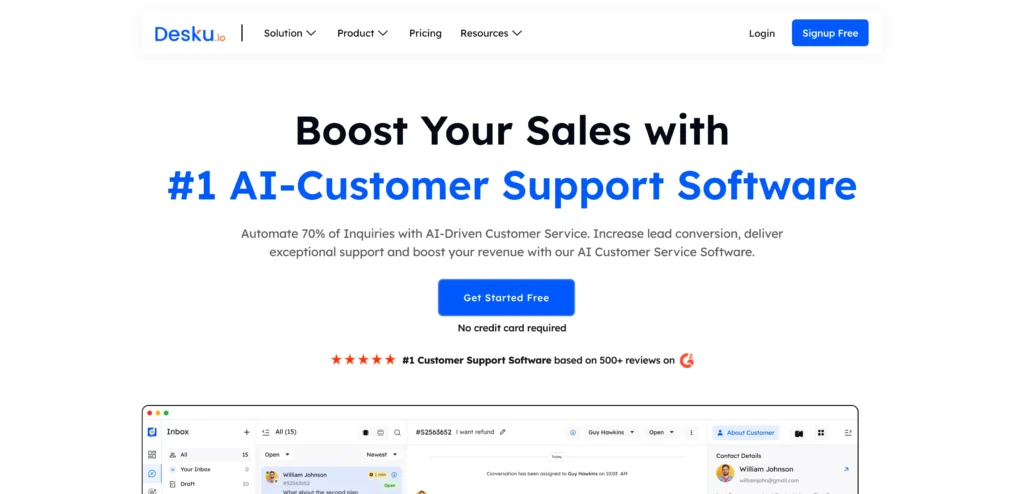
Desku is a helpful helpdesk software that makes customer support easier for businesses of all sizes.
Here are some important features of Desku:
- Multi-Channel Support: Desku allows businesses to handle customer communications from different places, like email, live chat, and social media, all in one platform. This helps ensure that customers get quick responses to their questions.
- AI Integration: The software includes AI-powered tools, such as the Eva AI chatbot, which helps automate responses and provide real-time support to customers. This feature makes customer service teams more efficient and improves how quickly they can respond.
- Ticket Management: Desku has strong ticket management capabilities, allowing support agents to track, prioritize, and resolve customer issues effectively. This system ensures that no customer query goes unanswered.
- Knowledge Base Creation: Users can easily create and manage a knowledge base, which provides customers with self-service options to find answers to common questions without needing direct support.
- Flexible Pricing: Desku offers flexible pricing plans that are suitable for different business needs, including a 14-day free trial and discounts for annual payments. This flexibility is especially appealing for small businesses looking for affordable solutions.
- User-Friendly Interface: The platform is designed to be easy to use, so support teams can navigate and utilize its features without needing a lot of training.
In summary, Desku is a powerful tool for businesses of any size that want to improve their customer support operations with advanced technology and flexible service options.
Why Desku?
Competitive Pricing Structure
- Affordability: Clearly state that Desku offers competitive pricing starting at $29/month, which is significantly lower than the entry-level plans of both Intercom and Zendesk.
- Cost-Effectiveness: Illustrate how Desku provides similar or superior features at a fraction of the cost, making it an attractive option for small to medium-sized businesses looking to optimize their customer support without breaking the bank.
- Value for Money: Discuss how Desku’s pricing is not just about being cheaper, but also about delivering greater value through comprehensive features that enhance customer engagement and support.
When you’re comparing Intercom and Zendesk, the key features can make all the difference in your customer support strategy.
You’ll want to focus on their help desk and ticketing systems, live chat and messaging capabilities, in addition to their reporting and analytics tools.
Understanding how AI and automation fit into each platform will help you choose the best solution for your team’s needs and enhance your customer interactions.
Help Desk and Ticketing Systems
The effectiveness of a help desk and ticketing system largely hinges on its key features, which play a crucial role in managing customer inquiries efficiently.
When you choose the right ticketing software, you’re not just getting a customer service solution; you’re investing in a tool that automates routing and tracking of inquiries. Key help desk features, like automated ticket assignments and internal collaboration tools, improve your team’s responsiveness and service quality.
Plus, advanced reporting capabilities allow you to analyze ticket volume and agent performance, pinpointing areas for improvement. Integrating these systems with other tools can streamline workflows across departments, making your operations seamless.
Don’t settle for less—opt for a help desk solution that truly raises your customer service experience.
Live Chat and Messaging Capabilities
While both Intercom vs Zendesk offer live chat and messaging capabilities, they cater to different priorities that can greatly impact your customer support strategy.
| Feature | Intercom | Zendesk |
|---|---|---|
| Live Chat | Advanced customization options | Basic tools with limitations |
| AI Chatbot | Fin handles 50% of queries | Answer Bot with fewer features |
| Customer Interactions | Focus on seamless engagement | Ticket management emphasis |
| Messaging Capabilities | Proactive, conversational approach | Reactive, support request-driven |
Intercom’s focus on customer interactions through real-time messaging makes it a formidable choice for businesses aiming for engagement. In contrast, Zendesk’s ticket management approach might suit those prioritizing structured support. Choose wisely to improve your customer experience!
Reporting and Analytics
In evaluating the reporting and analytics capabilities of Intercom and Zendesk, you’ll notice distinct focuses that can shape your decision.
Zendesk excels in detailed reporting, allowing you to track key metrics like ticket volume and customer satisfaction. Its custom reports provide tailored insights that can improve your support performance.
Conversely, Intercom prioritizes customer engagement, leveraging user behavior analytics to predict actions and enhance product usage understanding. This focus helps you gain actionable insights that can sharpen your engagement strategies.
Both platforms offer valuable analytics tools, but your choice should hinge on whether you need in-depth support metrics or a stronger emphasis on customer interaction.
Choose wisely, as these insights are essential for optimizing your customer experience.
AI and Automation
When choosing between Intercom and Zendesk for AI and automation, you’ll find that each platform offers unique strengths tailored to different support needs.
Zendesk offers pre-trained AI that utilizes billions of interactions, creating intelligent workflows that improve the customer experience and reduce administrative costs. In contrast, Intercom’s AI chatbot, Fin, resolves up to 50% of support queries instantly, setting a high bar for automation.
However, Zendesk’s focus on ticket automation with macros and triggers provides a more thorough approach. While Intercom emphasizes proactive engagement, it lacks advanced customization options, which could limit its automation effectiveness.
Ultimately, for robust customer support features and greater predictability in costs, Zendesk stands out as the stronger choice.
Pricing Comparison
In terms of pricing, you need to weigh Zendesk’s transparent plans against Intercom’s complex pricing structure.
While Zendesk’s costs might seem higher initially, its straightforward approach can save you money in the long run with no hidden fees.
If you’re looking for true value for your investment, understanding these differences will help you make an informed decision that benefits your business.
Zendesk Pricing Plans and Total Cost of Ownership
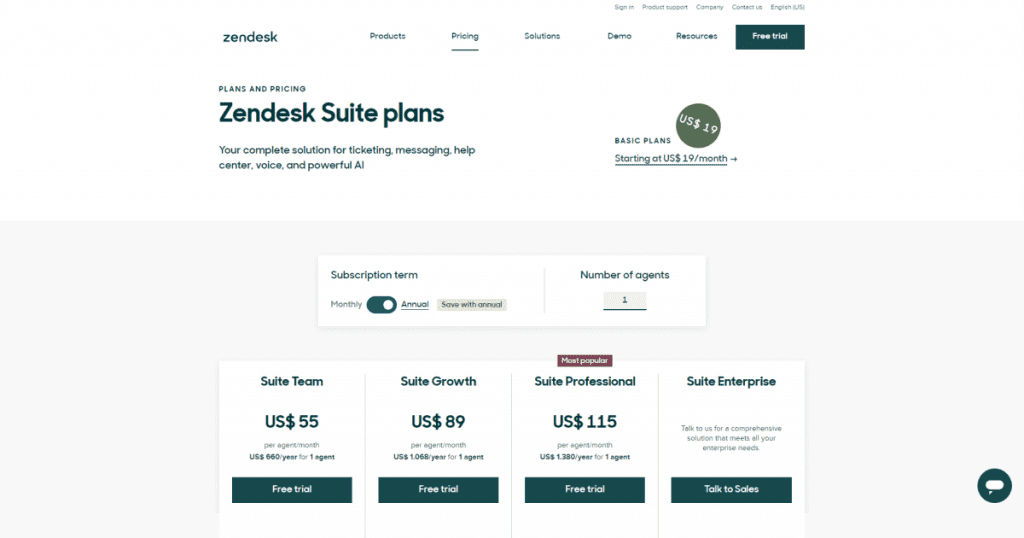
Zendesk’s pricing plans cater to a wide range of business needs, making it a flexible choice for companies of all sizes.
With a transparent pricing model ranging from $55 to $169 per month per agent, you can easily budget without worrying about hidden fees. The total cost of ownership is relatively low, thanks to simple setup and maintenance processes that lead to a faster return on investment.
Plus, Zendesk’s plans guarantee scalability, allowing your support system to grow alongside your business.
Intercom Pricing Plans and Value for Money
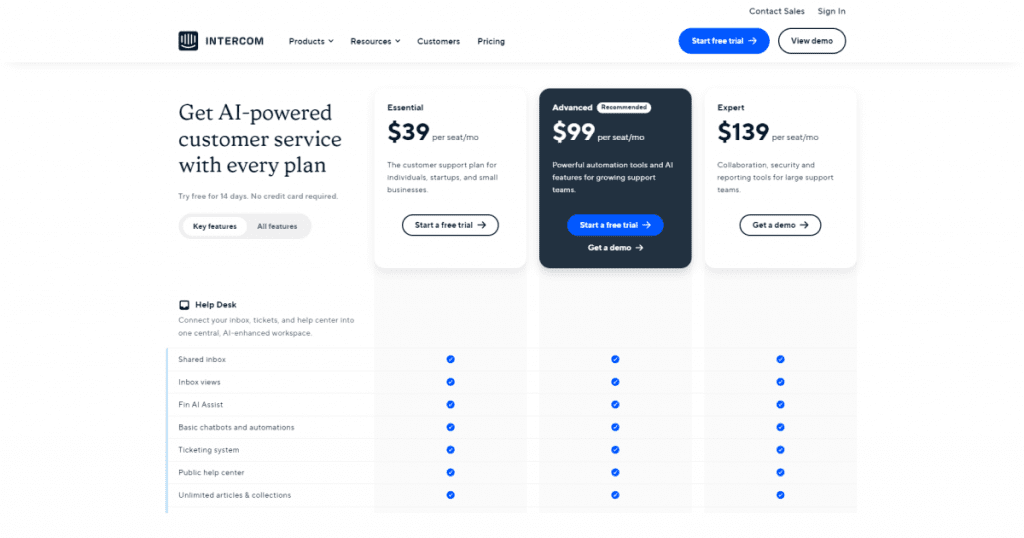
Intercom’s pricing plans present a more complex landscape compared to Zendesk’s straightforward model.
While Intercom starts at $39 monthly, costs can skyrocket over $1,000 for larger organizations due to user numbers and interactions. This often leads to unexpected expenses and hidden fees.
In contrast, Zendesk’s pricing model is transparent and easier to budget.
Here’s a quick comparison:
- Intercom’s Complexity: Add-ons can inflate costs greatly.
- Zendesk’s Non-Clarity: hidden fees, making budgeting harder.
- Desku’s Value for Money: Desku often provides a better ROI.
- Trial Opportunities: Desku offers a free trial, allowing assessment without risk.
Ultimately, consider the cost comparison carefully; choosing Desku may save you money and hassle in the long run.
User Experience and Interface
In terms of user experience, Zendesk’s intuitive design stands out, making it easy for agents to navigate and manage their tasks efficiently.
On the other hand, Intercom offers a modern interface that mimics popular messaging apps, which can improve user engagement but may also come with a learning curve.
Ultimately, choosing the right platform hinges on your team’s specific needs for usability and scalability—so it’s time to weigh your options carefully.
Zendesk: Intuitive Design and Scalability
Steering customer support becomes a breeze with Zendesk’s intuitive design and scalable features.
You’ll appreciate how its user-friendly interface simplifies navigation, allowing agents to resolve issues with just one click. Plus, Zendesk’s focus on scalability means it grows with your business effortlessly.
Here are some key benefits:
- Intuitive Design: Reduces the learning curve for new agents, ensuring quick onboarding.
- Customization Options: Tailor the user experience to your brand and specific needs.
- Agent-Centric Design: Streamlined workflows lead to better support outcomes.
- Extensive Integrations: Access over 1,500 no-code integrations for seamless adaptation.
With Zendesk, you’ll empower your team to deliver exceptional customer service while adapting to future challenges.
Don’t miss out on these advantages!
Intercom: User Interface and Ease of Use
Maneuvering customer support platforms can be challenging, but with Intercom’s modern user interface, everything feels familiar and intuitive.
You’ll find the design prioritizes conversational support, making it easy to navigate and engage with your customers. This user interface improves user behavior analysis by providing clear insights into customer interactions, so you can give personalized support effectively.
Plus, with advanced features like automation and customizable chat experiences, you can align the platform with your brand identity effortlessly. The ease of use guarantees that your team can quickly adapt, allowing for smoother shifts and enhanced service quality.
Intercom empowers you to create meaningful customer connections, making it a standout choice for your support needs.
Take action and uplift your customer experience today!
Integration Capabilities
In terms of integration capabilities, you can’t overlook Zendesk’s extensive range of options.
With over 1,500 no-code apps in its Marketplace and proven connections to major platforms like Salesforce and Slack, Zendesk makes it simple to adapt and scale your customer support.
In contrast, Intercom’s limited integrations might restrict your ability to connect with existing tools, which could impact your business’s growth and efficiency.
Zendesk: Robust Integrations Across Platforms
Zendesk empowers businesses with its robust integration capabilities, making it a versatile choice for customer support. With over 1,500 no-code apps available in the Zendesk Marketplace, you can easily connect with crucial tools to improve your operations.
Here are some key benefits of Zendesk’s integrations:
- Seamless connections with major platforms like Salesforce and Slack
- Improved data connectivity through marketing and analytics tools via mParticle
- Quick adaptations to new use cases with no-code integrations
- A free Intercom integration available for optimized workflows
These robust integrations allow your team to streamline processes, increase efficiency, and focus on delivering exceptional customer support.
Don’t miss out on the opportunity to uplift your service with Zendesk’s powerful platform!
Intercom: Integration with Existing Tools
For businesses looking to improve their customer support systems, Intercom offers impressive integration capabilities that can greatly elevate user engagement.
You can integrate with over 350 third-party tools, allowing you to streamline your customer communication effortlessly. With seamless connections to popular CRM, marketing, and analytics platforms, you’ll augment your operational efficiency considerably.
Intercom’s API also lets you create custom integrations, connecting your proprietary software or unique processes without hassle. Plus, you can set up automated workflows and triggers to respond to customer interactions across these integrated applications.
This means you’ll not only save time but also provide a cohesive customer experience. Don’t miss out on transforming your support system—consider Intercom’s powerful integration options today!
Why Customers Choose Zendesk Over Intercom
When you compare customer support platforms, it’s clear why many businesses are choosing Zendesk over Intercom.
Case studies from companies like Reprise, Novo, and Bitly highlight Zendesk’s powerful ticket management and user-friendly interface, which streamline operations and improve customer experience.
Case Studies: Reprise, Novo, Bitly
Many organizations have turned to Zendesk over Intercom for their customer support needs, and case studies from Reprise, Novo, and Bitly illustrate the reasons behind this choice.
- Reprise praised Zendesk’s robust ticketing functionality that streamlined support processes and improved response times.
- Novo benefited from Zendesk’s extensive integration capabilities, upgrading their customer experience management.
- Bitly appreciated the transparent pricing model, allowing for predictable budgeting compared to Intercom’s complexity.
- Both Reprise and Novo highlighted Zendesk’s user-friendly interface, which increased agent efficiency and reduced onboarding time.
Novo also reported faster ROI, thanks to Zendesk’s AI capabilities and automation features that cut administrative costs.
Choosing Zendesk means better support, improved integration, and a seamless customer experience.
Final Recommendation Based on Business Needs
Customer Service
- Desku: Offers a balanced approach between ticket management and customer engagement, making it suitable for businesses that need both functionalities without compromise.
- Zendesk: Best for ticket management but may lack engagement features.
- Intercom: Focused on customer engagement, which may not be ideal for all businesses.
Pricing Structures
- Desku: Provides transparent and competitive pricing, starting at just $29/month, making it accessible for businesses of any size. There are no hidden costs, ensuring you know exactly what you’re paying for.
- Zendesk: While it offers transparent pricing, it can be more expensive, especially as you scale.
- Intercom: Often surprises users with hidden costs, which can lead to unexpected expenses.
Integration Capabilities
- Desku: Supports a variety of integrations, allowing businesses to connect with the tools they already use without the complexity.
- Zendesk: Offers over 1,500 no-code integrations, which is impressive but may be overwhelming for some users.
- Intercom: Integration options are available but may not be as extensive as Zendesk.
User Experience
- Desku: Features a user-friendly interface that is easy to navigate, allowing support teams to get started quickly without extensive training.
- Intercom: Known for its modern interface, but it may not be as intuitive for all users.
- Zendesk: While functional, its interface can feel dated and less user-friendly compared to Desku.
AI and Automation
- Desku: Offers AI-powered tools that enhance customer support efficiency without sacrificing the human touch. This allows for a streamlined workflow that is easy to manage.
- Zendesk: Provides pre-trained AI, which is effective but can be complex to implement.
- Intercom: Focuses heavily on AI automation, which may not be necessary for all businesses.




